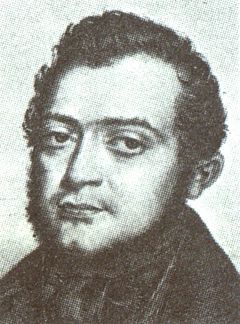- Dimitrija Demeter
-
Dimitrija Demeter 
Born 21 July 1811
Zagreb, Kingdom of Croatia,
Austrian EmpireDied 24 June 1872 (aged 60)
Zagreb, Austria-HungaryOccupation Poet, dramatist Language Croatian Literary movement Illyrian movement (Romantic nationalism) Notable work(s) Grobničko polje (1842)
Teuta (1844)Dimitrija Demeter (sometimes spelled Dimitrije Demeter or Dimitrije Demetar, 21 July 1811 – 24 June 1872) was a Croatian writer and dramatist.[1]
He was born in a merchant family of Greek origin (some mention Aromanian origin). He studied philosophy in Graz and medicine in Vienna and Padua. During his studies he practiced his literary work and after his return to Croatia he joined the Illyrian movement. At first he worked as a physician and from 1841 his main preoccupation was only literary work. In his texts he tried to join the tradition of the old Croatian literature with tendentions in European drama. He mostly used historical subjects to express his patriotic aspirations and to speak out about the current social situation in society.
In his most know drama Teuta, which is considered the first Croatian drama, he advocates the idea about Illyrian origin of all South Slavs. He also writes short stories, feuilletons, literary critics, he wrote librettos for Vatroslav Lisinski opera's Ljubav and Zloba and Porin and for his drama's Dramatička pokušenja I. (in 1834) and Dramatička pokušenja II. (in 1844). His role in organizing of cultural life in Zagreb and Croatia was of extreme significance. He was also editor or various almanacs: Iskra, Südslavische Zeitung, Danica, Narodne Novine and Hrvatski Sokol.
One of his most known works includes early romanic poem Grobnik field (near Rijeka) written in 1842 for the 600th anniversary of the Battle of Grobnik field where according to legend Croats defeated the invading Tatars. This works shows it was written by an extremely talented writer, although it was only his literary debut.
In it two main motives interweave: the motive of countryside and the motive of patriotism. Also inspired by Byron the concept of worldwide pain appears. Demeter used 10-syllable verse and 12-syllable verse to avoid monotounous routine of traditional folk songs while emphasizing characterization and strong characters of the main heroes and their passion. Instead of narrative epic tendency he gives to his poems a strong dramatic characteristics which remindins us of Byron's literary work.
The main Demeter's vision comes down to emphasizing general problems of humanity like for example: battle between good and evil, where at the end the good always prevails. This type of Demeter's poems in many things, both by verse and rhyme, announces the most important literary work in Croatian literature of that time: epic poem The Death of Smail-aga Čengić written by Ivan Mažuranić in 1845. Among Demeter's poems a special place also takes his Pjesma Hrvata (Song of the Croats) which is a 8-syllable verse most known by its starting verse "Prosto zrakom ptica leti".
Dimitrija Demeter was also one of the founders of the Croatian National Theater (Hrvatsko Narodno Kazalište - HNK). It was on his encouragement that the Croatian Parliament founded the permanent theater in which Demeter was both the manager and dramatist. In 1907 Demeter's award for drama was established.
Demeter died in Zagreb on 24 June 1872 and was originally buried at the Orthodox cemetery in Pantovčak neighbourhood. Upon the closure of most old cemeteries in Zagreb in the 1870s and the designation of Mirogoj Cemetery as the primary municipal cemetery, his remains were moved to Mirogoj several years later, where they are still kept today.[2]
References
- ^ "NA DANASNJI DAN Umro dr. Dimitrije Demeter" (in Croatian). Croatian Radiotelevision. 24 June 1998. http://www.hrt.hr/arhiv/98/06/24/d1_hrv.html. Retrieved 13 October 2010.
- ^ "History of Mirogoj" (in Croatian). Mirogoj Cemetery. http://www.gradskagroblja.hr/Default.aspx?art=296&sec=126. Retrieved 13 October 2010.
Categories: 1811 births | 1872 deaths | People from Zagreb | Croatian people of Greek descent | Croatian dramatists and playwrights | Croatian poets | Croatian national awakeners
Wikimedia Foundation. 2010.
